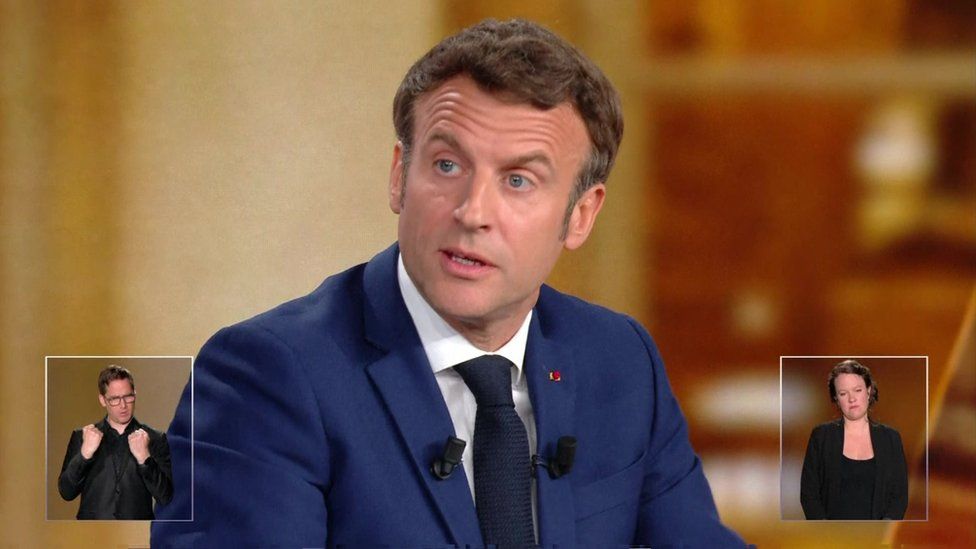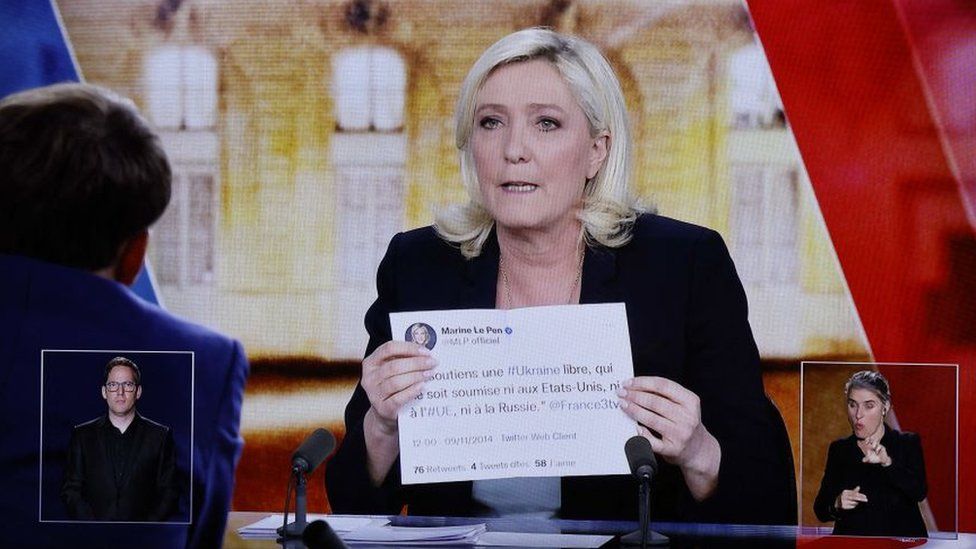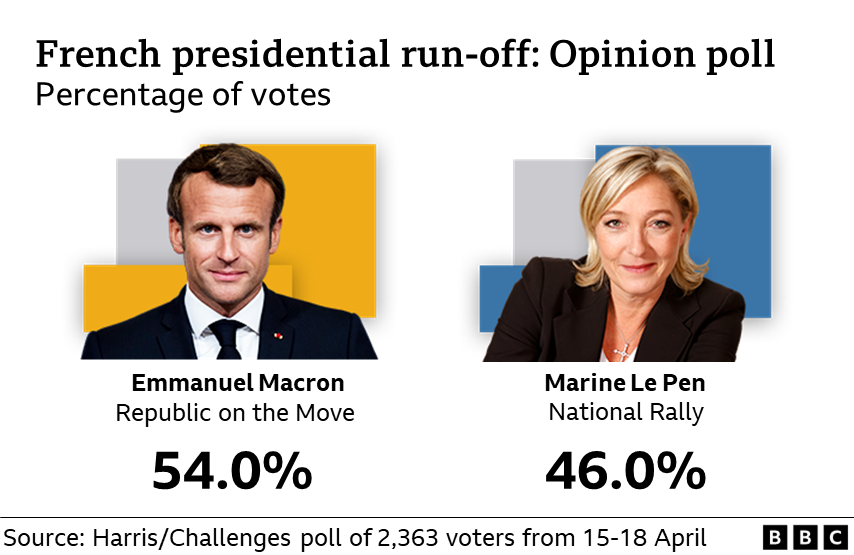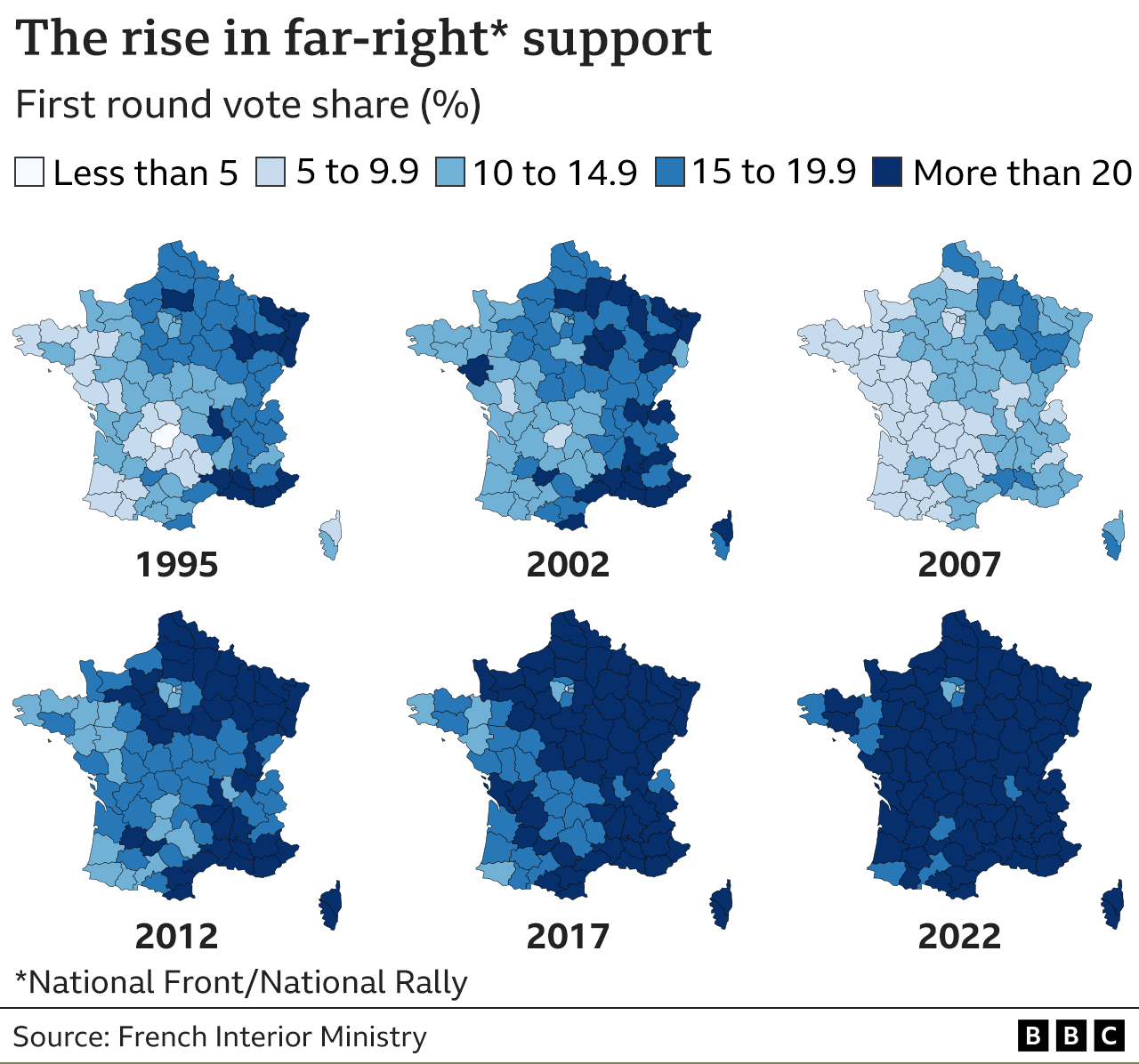The two French presidential candidates squared off in their only televised debate ahead of Sunday’s second-round run-off vote.
Marine Le Pen, the far-right leader, has fallen behind centrist Emmanuel Macron in polls, but millions of voters remain undecided.
It didn’t take long for the two-hour-45-minute brawl to begin.
The candidates debated the cost of living, Russia, climate change, and immigration.
Around 15.6 million people watched the debate, in which Mr Macron accused his opponent of being dependent on Russian power and Marine Le Pen called him a climate change hypocrite.
The campaign has been dominated by spiraling prices, which have quickly taken center stage in the debate.
Emmanuel Macron was widely seen as the winner of the pair’s 2017 encounter, when his rival appeared flustered and underprepared. But this time, Marine Le Pen was ready from the start and far more composed.
Throughout the debate, it was Mr Macron who went on the offensive, appearing more like a challenger than an incumbent, repeatedly interrupting his rival.
Ms Le Pen said 70% of the French people believed their standard of living had fallen over the past five years and she would be the president of civil peace and national brotherhood. “We need to give priority to the French in their own country,” she said.
Mr Macron said France had known unprecedented crisis, with Covid followed by war in Europe. He had steered France through those challenges and aimed to make France a stronger country: the vote was a “referendum on Europe, on secularism, and a moment of clear choice”, he said.
Despite a strong performance from Ms Le Pen, a snap Elabe poll of voters suggested 59% of viewers thought Mr Macron had come out the winner.
The sitting president was seen as most presidential, by 53% to 29%, although half of viewers also said he had come across as arrogant. Ms Le Pen was narrowly deemed to be more in tune with normal people, although 50% found her “worrying”.
Macron avoids debate traps

The president’s difficulty was that unlike in 2017, he is now defending a record in office.
It meant that when asked what he planned for a second mandate, he had to stick to the unexciting option of continuity. His opponent could make hay with attacks on the inevitable failures of five years in government.
And yet, the president never gave the feeling he was not on solid ground. His attacks on Marine Le Pen over the Russian loan, over Europe and over the Islamic headscarf all hit home.
On the economy, he argued forcefully that his already-enacted proposals for protecting the French from inflation – a cap on fuel prices and tax exemption for pay bonuses – were both fairer and more effective than Madame Le Pen’s ideas.
And in the main, he avoided the trap of coming over as too arrogant or technocratic. Often, he gave the impression of wanting to launch himself more strongly against his opponent but of holding himself back.
How debate unfolded
After a relatively civil start, it quickly turned combative when the two candidates addressed the biggest issue for voters.
Cost of living: From the start Marine Le Pen said this was her priority: “I will permanently cut VAT on energy. I will also cut taxes, no income tax for under-30s.” She accused Mr Macron on letting pension levels fall in real terms too.
Mr Macron said his solution was to impose a cap on prices which was “twice as effective as dropping sales tax”.
They became animated as they disagreed on how to bring down energy prices. Mr Macron repeatedly challenged his opponent’s proposals as unworkable. She snapped back: “I want to give the French their money back.”

Russia’s war in Ukraine: Emmanuel Macron said Russia was “going down a fatal path” and the role of France and Europe was to provide Ukraine with military equipment and take in refugees.
Ms Le Pen, criticised for her close ties to the Kremlin and for taking a Russian bank loan for her party, warned that giving Ukraine weapons could make France a “co-belligerent”. However, she supported her opponent’s policy of backing Ukraine and taking in refugees.
At this point Mr Macron went on the offensive, pointing out she was one of the first political leaders in 2014 to recognise Russia’s annexation of Crimea. “You’re speaking to your banker when you speak to Russia,” he said.
Ms Le Pen said she had taken Russian money as no French bank would lend to her party. When she argued that she had had to borrow money like millions of French people, he countered that the French did not look to Russia for finance.

European Union: Marine Le Pen has changed her policy from leaving the EU to seeking change from within it. But Mr Macron argued that her idea of a “Europe of nations” would spell the end of the EU and that “you are selling a lie”.
In the current EU she said France was failing to defend its interests and she would stop negotiating trade deals that “hurt French producers and farmers”.
Retirement age: This is another of the big election issues: Emmanuel Macron has said France needs to raise the pension age from 62 to 65 over nine years, while Ms Le Pen wants to keep it at 62.
Ms Le Pen said his proposal was “absolutely intolerable”. He hit back saying she was promising to be more generous with pensioners but did not explain how she would pay for it.
Climate change: Renewable energy is another issue where the two candidates are diametrically opposed and it became one of the most animated points of the debate. The only thing they agree on is building more nuclear power stations.
“You are a climate sceptic, that’s pretty obvious,” Mr Macron said to his rival. The only Green presidential candidate has urged his voters to back the incumbent president. Marine Le Pen retorted that he was a “climate hypocrite”.
Marine Le Pen argued importing goods from thousands of miles away was responsible for climate change and producing locally would help tackle global warming. There was nothing worse than wind turbines, she complained. He countered that her policy of relying on nuclear power to replace fossil fuels was “untenable” and renewables had to be part of the mix. “Wind turbines create jobs,” he added.
Immigration and Islam: Marine Le Pen went on the offensive, promising a referendum on who should stay and who should leave France and condemning what she called “anarchic and massive immigration” that contributed to a sense of insecurity.
She then spoke about another of her key policies, banning the wearing of the headscarf in public, arguing that women had to be liberated from “Islamist pressure”. Mr Macron objected it was wrong to mix Islam with Islamism. Her policy, he said, would lead to “civil war” and was a betrayal of French values: “You would have police running down the street after girls in headscarves and [Jewish] boys wearing the kippah.” It was intolerant and she was pushing millions of compatriots out of the public space on account of their religion, he said.
Constitutional change: Another of Marine Le Pen’s big policies is for citizens’ referendums, which she said were rooted in the yellow-vest or gilets jaunes protests that began early in the Macron presidency. “The main problem after your five-year term is that you have divided the country. We need to rebuild France and bring people together.”
One of the big attractions of such referendums for Ms Le Pen is that they would bypass parliament, where she has only a handful of MPs. Mr Macron said they would be unconstitutional.
Significance of debate
Televised confrontations between the top two candidates have been a highlight of French presidential elections for almost five decades and they have proved most decisive when the polls are close.
In 1974, conservative Valéry Giscard d’Estaing went on to beat Socialist François Mitterrand after performing well in their debate. Mitterrand did better in the rematch in 1981 and won the run-off vote.
This was the first time since then that the same candidates have squared off in two consecutive elections.
The 2017 debate was a disaster for Ms Le Pen that led to a big election defeat. This time around the race is much closer and her strong performance could help win over undecided voters.

The gap in the opinion polls has widened slightly since the first round vote in which the incumbent president won 27.85% and Ms Le Pen came second with 23.15%. But they are still fluctuating wildly, suggesting Mr Macron will secure between 53% and 57% of the vote.
What the candidates stand for
The choice for voters is far clearer than five years ago, when Emmanuel Macron won with very little experience as a politician.
His strict Covid policies alienated many voters and he has been accused of acting as a “president for the rich”. He is more popular in the big cities but has secured the support of other mainstream left and right parties for his pro-EU liberal and global outlook.
Marine Le Pen has toned down her nationalist, anti-EU rhetoric during the campaign but as she made clear in the debate her aim remains to revise France’s relationship with the European Union.




